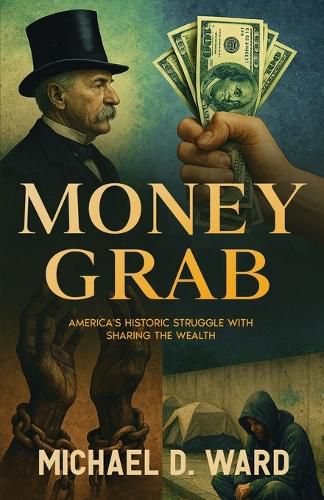Readings Newsletter
Become a Readings Member to make your shopping experience even easier.
Sign in or sign up for free!
You’re not far away from qualifying for FREE standard shipping within Australia
You’ve qualified for FREE standard shipping within Australia
The cart is loading…






This title is printed to order. This book may have been self-published. If so, we cannot guarantee the quality of the content. In the main most books will have gone through the editing process however some may not. We therefore suggest that you be aware of this before ordering this book. If in doubt check either the author or publisher’s details as we are unable to accept any returns unless they are faulty. Please contact us if you have any questions.
The United States is the wealthiest nation on earth, though an elite ownership class primarily holds its wealth. Working-class wages have not kept up with inflation or the cost of living. As our government weighs taxation and the cost of social programs, it is helpful to understand our history, which Money Grab discusses - from colonial days through the Civil War. Our struggle sharing the wealth has roots in the period of reconstruction, Jim Crow laws, and government-imposed discrimination in housing and employment.
Money Grab describes U.S. income and wealth disparity and research on the persistence of poverty and generational wealth. Our system was initially designed to tax those who can afford it and gain the greatest economic benefits. The author reviews the evolution of the tax code and the significant shifts that occurred.
The Industrial Revolution changed how workers relate to owners. Money Grab describes how labor policy once helped but now impedes the working class from securing an economic foothold and discusses the evolution of corporations and how they are taxed. Courts have granted corporations individual rights under the Constitution, giving those who control them a disproportionate voice in government and unduly influencing legislation and policy.
Solutions require strong democratic participation. Money Grab describes democratic history and participation over centuries. U.S. democracy is 250 years old, but the right to vote has only been broadly guaranteed for decades. We have lower voter participation than other developed countries, leaving control to those who participate and shape the system to their benefit.
Poverty and health are closely correlated. Money Grab discusses how the right to health and healthcare in the U.N.'s Universal Declaration of Human Rights is recognized by many developed countries, excluding the U.S. Despite spending more of its GDP on healthcare than any other developed country, the U.S. has worse health outcomes.
An economically polarized society is not sustainable. Money Grab closes with recommendations on tax and other policy choices that could help overcome the income and wealth disparity in the U.S. today.
$9.00 standard shipping within Australia
FREE standard shipping within Australia for orders over $100.00
Express & International shipping calculated at checkout
This title is printed to order. This book may have been self-published. If so, we cannot guarantee the quality of the content. In the main most books will have gone through the editing process however some may not. We therefore suggest that you be aware of this before ordering this book. If in doubt check either the author or publisher’s details as we are unable to accept any returns unless they are faulty. Please contact us if you have any questions.
The United States is the wealthiest nation on earth, though an elite ownership class primarily holds its wealth. Working-class wages have not kept up with inflation or the cost of living. As our government weighs taxation and the cost of social programs, it is helpful to understand our history, which Money Grab discusses - from colonial days through the Civil War. Our struggle sharing the wealth has roots in the period of reconstruction, Jim Crow laws, and government-imposed discrimination in housing and employment.
Money Grab describes U.S. income and wealth disparity and research on the persistence of poverty and generational wealth. Our system was initially designed to tax those who can afford it and gain the greatest economic benefits. The author reviews the evolution of the tax code and the significant shifts that occurred.
The Industrial Revolution changed how workers relate to owners. Money Grab describes how labor policy once helped but now impedes the working class from securing an economic foothold and discusses the evolution of corporations and how they are taxed. Courts have granted corporations individual rights under the Constitution, giving those who control them a disproportionate voice in government and unduly influencing legislation and policy.
Solutions require strong democratic participation. Money Grab describes democratic history and participation over centuries. U.S. democracy is 250 years old, but the right to vote has only been broadly guaranteed for decades. We have lower voter participation than other developed countries, leaving control to those who participate and shape the system to their benefit.
Poverty and health are closely correlated. Money Grab discusses how the right to health and healthcare in the U.N.'s Universal Declaration of Human Rights is recognized by many developed countries, excluding the U.S. Despite spending more of its GDP on healthcare than any other developed country, the U.S. has worse health outcomes.
An economically polarized society is not sustainable. Money Grab closes with recommendations on tax and other policy choices that could help overcome the income and wealth disparity in the U.S. today.